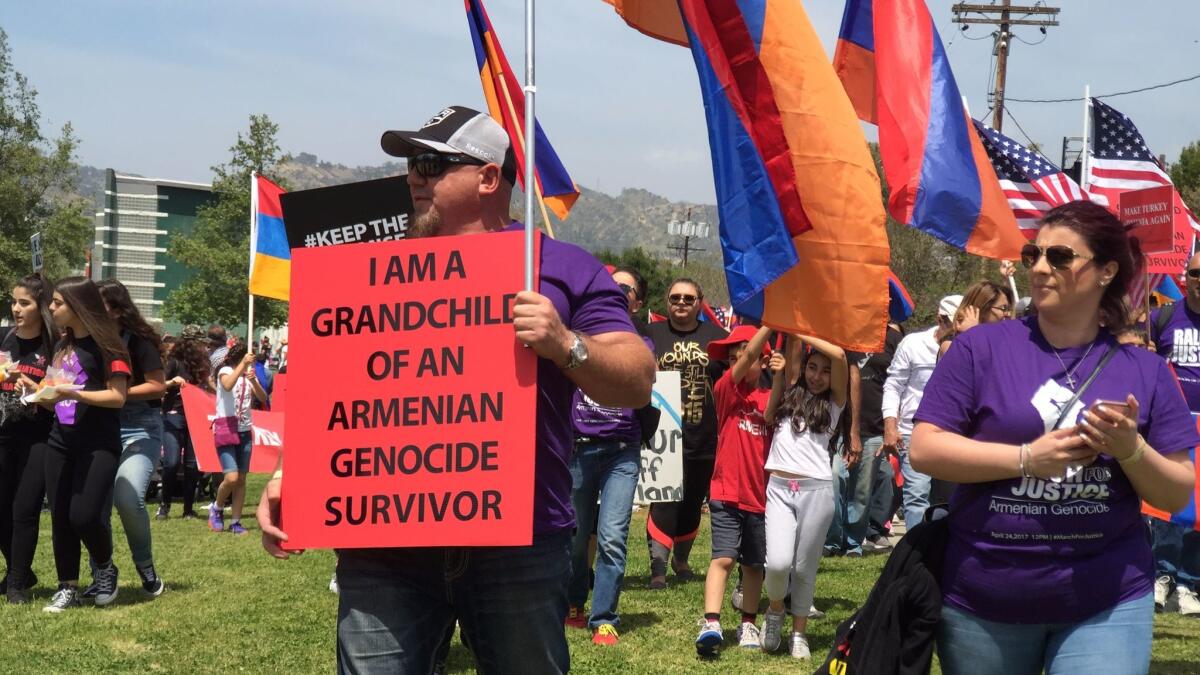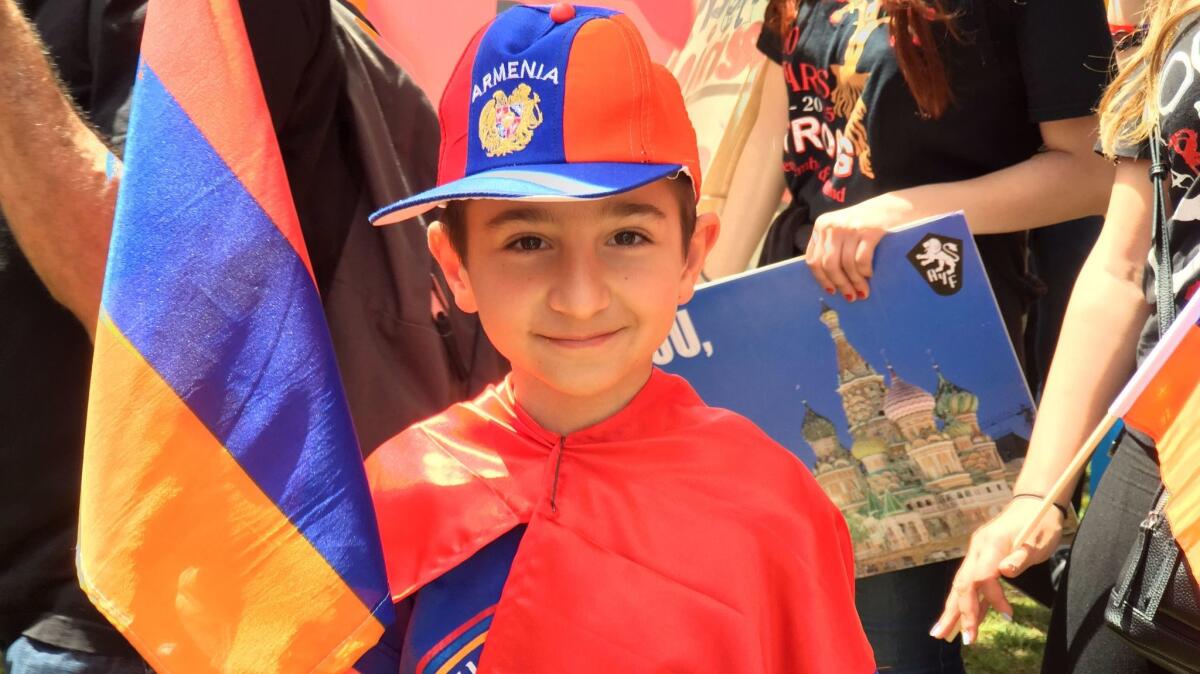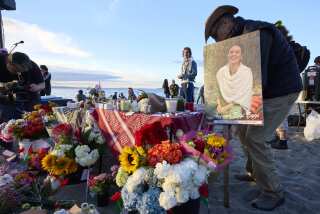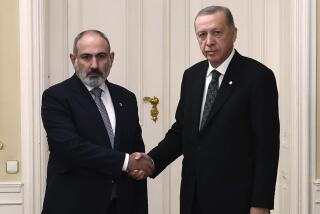California Journal: Trolled by a plane trailing the Turkish flag, families of Armenian Genocide survivors insist that Turkey admit its guilt

- Share via
As I walked across Pan Pacific Park to my car on Monday, I came upon signs discarded after the March for Justice.
A few hours earlier, thousands of Armenian-Americans had gathered here, the starting point for an annual 1.5-mile march demanding that the Turkish government admit, once and for all, that it orchestrated the first genocide of the 20th century.
I reached into the pile for one that had been tugging at my heart all day: “I am a Grandchild of an Armenian Genocide Survivor.” I put it in my trunk and brought it home.
Unlike Jews, who cannot escape the sometimes daily fact of anti-Semitism, Armenian-Americans who are a generation or two removed from the 1915 genocide can choose to dwell on the past, or not.
Most of our grandparent-survivors have died, and the stories they told — about the teenager who left for America and never got the chance to send for his family before they were murdered (my grandfather), about the orphaned Armenian boy rescued by a Kurdish family (my great aunt’s husband) — seem like distant history.
Would it really mean that much, anyway, for Turkey to admit now that the founders of its modern republic engaged in the systematic extermination of 1.5 million Armenians, Assyrians and Greeks a century ago?
Absolutely.
Truth is truth. Holocaust deniers rightfully earn the scorn of decent people everywhere. And so, too, should Armenian-genocide deniers.
Denial, after all, is insidious. Over time, like water dripping on hard rock, it has the power to reshape history.
Here’s an example of how it works: Every year on April 24, news stories commemorate the anniversary of the genocide, which is observed by Armenians around the world. Every year, a handful of those reports contain qualifiers that cast doubt on the truth of the experience. (“Most historians say…” or “the 102nd anniversary of the Armenian genocide, which began in 1915 in what many say was a systematic campaign of ethnic cleansing.”)
“If they had taken the proper steps to have accountability for our genocide, perhaps others, like the Holocaust, Cambodia or Rwanda would never have happened,” said Kren Gasparian, 44, an engineer at Fox Cable Networks. He stood in Pan Pacific Park wearing a T-shirt celebrating a 2005 concert by System of a Down, the Armenian-American hard rock band with outspoken views about Turkish genocide denial.
“We all know Hitler’s famous quote before invading Poland,” Gasparian said. “‘Who, after all, speaks today of the annihilation of the Armenians?’ And everybody knows that there was a big German presence in Ottoman Turkey during World War I, so we were kind of the blueprint for the Nazis.”
::
At the march, it was heartening to see so many kids, born nearly a century after their families were devastated, taking on the responsibility of making sure the world does not forget.
A shy 7-year-old from Glendale, Haik Akopyan, wore the red, blue and orange flag of Armenia like a superhero cape. Eleven-year-old Narek Abedian, a sixth-grader from Burbank, was surprised to find himself leading marching chants. “My friend said ‘Let’s do it!’” he told me, so he began to belt out “Turkey run, Turkey hide, Turkey is guilty of genocide.”

I stopped to talk to some Pasadena teenagers who attend a private Armenian high school. Katia Khanlian said her great-grandmother’s fiancé was killed in the genocide. Galin Aghegian told me her great-grandmother was part of a forced march to Aleppo. Stephanie Khatchikian said her great-grandfather was driven from Constantinople and ended up in San Francisco.
As we waited for the march to start, a deplorable form of trolling was taking place in the sky.
Two small planes circled overhead. One trailed a giant Turkish flag. The other a banner that read “Stop Armenian Lies.” On the ground, people saluted the planes with their middle fingers.
One reason it’s been relatively easy for Turkey to deny history is that American presidents, worried about ticking off a military ally, have given it a pass. “As president, I will recognize the Armenian Genocide,” said then-candidate Barack Obama in 2008. (He never did.)
And don’t look to President Trump. Not only does he have a big real estate project in Istanbul, he was the first Western leader to offer congratulations to the autocratic Turkish Prime Minister Recep Tayyip Erdogan, who’d just won a referendum (probably by fraud) that greatly expands his powers. Monday, Trump released a statement describing “one of the worst mass atrocities of the 20th century.”
But of course, he refrained from using the g-word.
::
After a couple of hours, I peeled away from the crowd and walked over to The Grove to watch “The Promise,” a film touted as the first big-budget American feature about the Armenian Genocide.
It was beautiful, and heartbreaking, and tells the story of the genocide in a way that could educate moviegoers the same way a film like “Schindler’s List” brought the Holocaust home to a new generation.
“There is no war here,” an angry Turkish official tells an American reporter played by Christian Bale. “Only evacuation of the civilian population to safer areas.”
I had a powerful moment of recognition during the film while watching the face of its star. Oscar Isaac plays Mikhail Boghosian, an Armenian medical student who endures unimaginable loss over the course of the film, losses familiar to all the Armenian families who marched on Monday.
His eyes were filled with such sadness, and I immediately thought of a photograph of my grandfather, Mike Abcarian, standing in his Fresno barber shop in 1939, looking into the camera with deep, soulful eyes. In 1912, at 18, he emigrated to America from Diyarbakir in Turkish Armenia. He sailed from Alexandria, Egypt, and planned to send for his family. He never got the chance. They were murdered in 1915. Only his younger sister, who was pinned under her mother’s body, survived.
I never knew my grandfather. He died before I was born. But I picked up that sign in Pan Pacific Park for him.

Twitter: @AbcarianLAT
ALSO
XXX
XXX
More to Read
Sign up for Essential California
The most important California stories and recommendations in your inbox every morning.
You may occasionally receive promotional content from the Los Angeles Times.











